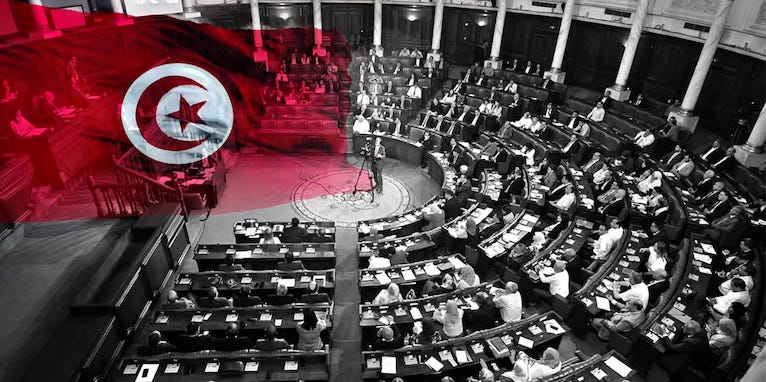

The difficult path of democratic transition may be more costly than the period of authoritarianism. The Tunisian experience ten years after the revolution attests to that. It was not enough to topple the head of the regime or change the government or draft an alternative emancipatory constitution or for new faces that represented the opposition to reach decision-making positions after spending time in jail or exile. It was not sufficient to hold free and, to some extent, fair elections or to impart Parliament with broad powers, making it the strongest authority in the new political regime and putting an end to all means allowing a president to become the only leader who may not be criticized. It all happened in Tunisia, making it the only Arab country to be allowed into the club of democratic nations. Nevertheless, Tunisians face a deep economic and social crisis. They live in an unprecedented state of chronic anxiety, waiting impatiently to get out of this tunnel.
Alarming Figures
In contrast to the eight governments formed since the revolution, the government of Hisham El-Mechichi presented a draft budget for 2021 that included the correct numbers, without the usual concealment or evasion. It came as a strong shock when it became apparent that Tunisia is heading towards bankruptcy. If the situation continues for a few months, the government might not be able to pay public sector salaries.[1] For the first time in the country's history, expenditures exceeded the volume of income, causing a current budget gap of 11,248 million dinars, of which 2,400 MD is internal borrowing and the rest will be secured through resorting to external borrowing. However, experts are warning against resorting once again to medium and long-term external debt, which broke a record of about 80.957MD. The Central Bank Governor expected that the medium and long-term external debt service would reach 9.501 billion dinars in 2020, [2] which made creditors doubt the ability of the Tunisian state to honor its commitments to pay its debts and interests for the first time, making negotiations more difficult and painful. Also for the very first time, the Central Bank Governor refused to respond to government requests to finance the 2020 budget deficit, in the absence of an explicit mandate from Parliament. He considered that the issuance of additional securities would lead to an insane increase in prices, which could cause a social uprising.
The Trade Union Movement in the Hot Zone
The trade union movement is in a difficult position. The deterioration of purchasing power as a result of high prices is still pushing the UGTT and the rest of the unions to demand the government and the private sector to raise wages, while experts consider that the wage mass in Tunisia is equivalent to 17% of the GDP, which is the highest in the world. [3] While the government aims to embark on implementing major reforms, including reforming bankrupt public institutions, and proposes to sell or deeply restructure some of them, the trade unions reject the policy of giving up these institutions. They are calling for other solutions to be considered. The disagreement continues with the government over the issue of reducing the wage bill.[4]
Failure to Link the Political with the Economic
Among the major dilemmas revealed by the Tusnisian revolution is the link between political and economic reforms, given their close ties. However, the rope is still missing ten years after the revolution. The important political democracy that has made great strides has not yet been able to help the economic movement move towards a better situation. On the contrary, the economy was greatly affected by political and governmental instability, causing the growth rate to decline from about 5% in 2010 to negative 2.2%. The COVID-19 pandemic further damaged the mechanisms of the local economy, leading to "a decline in GDP, at 2019 prices, during the second third of 2020, at the unprecedented rate of minus 21.6%."
Unemployment, on the other hand, became worse than before the revolution. According to the amended 2020 Budget bill, the unemployment rate increased to 18% during the second quarter of 2020, compared to 15.1% during the first quarter of the same year. It jumped by 3 points in a single third. The bill indicated that male unemployment amounted to 15.2% compared to 25% for females.[5]
The Tunisian economy is ill. Economist and former Finance Minister Hakim Ben Hammouda expected a major economic downturn during 2020. He considered that the COVID-19 crisis will be behind this decline by 3.8% in 2020, which is "the most serious rate of contraction in the economy that Tunisia has known since independence."[6]
Ennahda: Crisis with the Leadership
Faced by this alarming scene, parties and trade unions seem unable to contribute to its confrontation or improvement. The continuing conflict among its components is at its most intense, eliminating its ability to at least present an alternative proposal. The crisis of confidence with the public continues, as Tunisians still assert that parties have not done anything to advance the country since the beginning of the democratic transition. Making things worse, several major parties faced successive internal crises, the latest of which was the wide open conflict within the Islamic Ennahda movement. It was due to the refusal of its leader, Rashid Ghannouchi, to abide by the internal law of the movement that prevents him from running for a third term for the movement's leadership during its eleventh conference,[7] which was postponed under the pretext of the COVID-19 epidemic. Ennahda is considered the most prominent and most organized party. In the event of its division or the resignation of a large number of its cadres in the first and second ranks, its chances in the upcoming parliamentary elections will be weaker. It will open the way for the disruption of the balance of power and the possibility of the rise of the Free Constitutional Party Led by Abeer Moussa, who explicitly calls for putting the revolution on hold, returning to the pre-2011 era, and trying to reproduce the experiments of former president Zine El Abidine Bin Ali.
Hope Remains
The situation is complex and dire, which explains the tendency of Tunisians to pessimism, which reached 79.6% regarding their belief that the country is on the wrong path. However, many assert that Tunisia is not a hopeless situation and that the opportunity still exists to get out of the current impasse, a natural stage of democratic transition. The important thing is to find the economic key that will open up different horizons for Tunisians so that their revolution does not fall into the clutches of the old regime.
Salaheddine Al-Jourchi
Reference:
1- In the last four years, Tunisian governments failed to bring down the volume of salaries and implement the state’s pledge to limit it to 12% of the GDP, according to an agreement signed with the IMF in 2016, according to Al-Araby Al-Jadeed Newspaper on 26/10/2020.
2- Shems FM, 7/2/2020, https://www.shemsfm.net
3- Economic expert and MP Faisal Derbal, Nessma TV website, 6/11/2020: www.nessma.tv
4- Economic expert, Moez Al-Joudi, told Al-Araby Al-Jadeed newspaper that Tunisia did not comply with the conditions of economic reforms, including curbing the wage bill, which is likely to affect the terms of future negotiations with the IMF and other financial partners. The New Arab, October 26, 2020.
5- Mosaique FM, October 16, 2020, 12:30: www.mosaiquefm.net
6- Hakim Ben Hammouda on Facebook on April 13, 2020, in Business News Arabic, April 13, 2020.
7- The head of the Ennahda Shura Council confirmed that Ghannouchi will respect Chapter 31 of the Bylaws, but controversy continues about the new position that will be created to enable him to continue to play a major role by virtue of being the founder of the movement.
Recent publications

